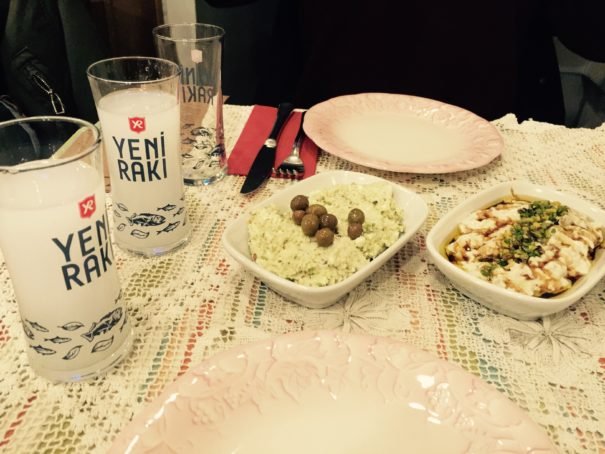
Longing for a Natural Catastrophe in a Year of Human Horrors

Longing for a Natural Catastrophe in a Year of Human Horrors

Raki in Istanbul
When a college friend decided to swing by Istanbul I thought, what better way to introduce him to the city than a meyhane (a Turkish gastropub) located in the trendy Kadikoy neighborhood on the Asian side of the city?
Mostly, I wanted to leave the European side. I needed an excuse to get out of my bubble, the Besiktas district, where two bombings had left 44 people dead and hundreds injured on Monday. I’d felt the explosions, a deep rumbling sound vibrating around me. After a year of terrorist attacks, tear gas, and an attempted coup, I’d hoped that what was happening was a long overdue earthquake. That’s sick, I know, but I’d have preferred a natural catastrophe in this year of human horrors.
We meet up at the Besiktas pier, exchanging warm hugs after some years, catching up about people we knew, places we’d been, jobs we’d tried. When the ferry comes, we go to the top though it’s cold. He has to see the scenery as we leave Europe: the Bosphorus Bridge (artfully renamed the 15th of July Martyrs bridge) is drenched in red light, like the Turkish flag draped from every building in every street.
We get to the meyhane and I decide that we must order raki, a strong, anise-flavored liquor that’s a lot like ouzo. I pour some of the spirit into our glasses over two cubes of ice, following it up with splashes of water that turns the drink into clouds of white smoke. The Turks call it aslan sutu (lion’s milk), and I normally don’t like the stuff. Some say raki makes for a silly drunk, but I guess it makes us political. We talk about the West, the East, Trump, Syria, Capitalism, Turkey, Journalism, Russia, and the “Kurdish Question.”
You know, you don’t really hear about the PKK back home. The Western media even glorifies them a bit, my friend says.
Everyone loves the underdog, especially if you’re going up against ISIS. But this is so personal for people here. Everyone knows a policeman, a soldier, a brother or father who died in this conflict, I try to explain.
I go on to rant about how this stuff is complicated: how there was a ceasefire until there wasn’t; how Turkish liberals did support a Kurdish political party until they couldn’t; how violence became so commonplace that one couldn’t think straight anymore. There have been dozens of terrorist attacks in the past year. Putschists killed civilians and flew F-16s so low they broke the sound barrier. Now, we’re in a state of emergency, and the push to change the country’s parliamentary system to an executive presidency is gathering steam.
You’re either seen as a state apologist or a terrorist sympathizer, I say to my friend. Living in Turkey, I’ve come to view nuance as a luxury afforded to you when the stakes aren’t a matter of life and death.
A child walks in at some point, pushing a packet of tissues into our face. We don’t pay him any attention; no one does. The hostess tenderly tells him to leave.
My friend and I say our goodbyes. Slightly drunk, my phone at ten percent, I take the ferry to the Golden Horn. It’s where the Boaz meets the Marmara Sea. Russian ships often pass through these straits which feed into the Mediterranean, possibly, probably, perhaps headed to Syria. The ferry rocks in the dark water. I’m looking over my shoulder, turning back with every sound, every movement.